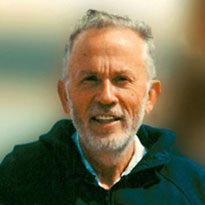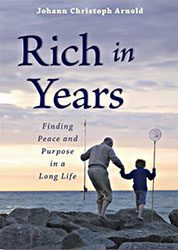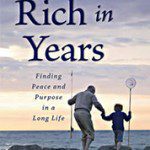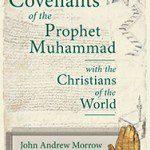 Johann Christoph Arnold is an award-winning author with over a million copies of his books in print in more than 20 languages. A noted speaker and writer on marriage, parenting, and end-of-life issues, Arnold is a senior pastor of the Bruderhof, a movement of Christian communities. With his wife, Verena, he has counseled thousands of individuals and families over the last forty years.
Johann Christoph Arnold is an award-winning author with over a million copies of his books in print in more than 20 languages. A noted speaker and writer on marriage, parenting, and end-of-life issues, Arnold is a senior pastor of the Bruderhof, a movement of Christian communities. With his wife, Verena, he has counseled thousands of individuals and families over the last forty years.
His new book, Rich in Years: Finding Peace and Purpose in a Long Life, is a featured Patheos Book Club for the month of December. Here, Arnold reflects on aging, suffering, loneliness, euthanasia, and “living in the light of eternity.”
There is a multibillion dollar anti-aging industry trying to keep us young. Yet in Rich in Years, you suggest that trying to stay young is the worst way to grow old. Why?
Yes, there is an entire industry dedicated to making us look younger than we are. But who are we fooling, and what are we ashamed of? We seem to think we can live forever and pride ourselves on pushing the limits of age, but by doing so we push God out of our lives. Instead of worrying about trying to stay young we should enjoy the riches that old age offers. And instead of trying to extend life’s length, we should be concerned with deepening life’s meaning.
 In Rich in Years, you have collected stories of people who continue to love life regardless of their health or circumstances. What’s their secret?
In Rich in Years, you have collected stories of people who continue to love life regardless of their health or circumstances. What’s their secret?
Those who retain a sense of adventure as their health declines will be able to face the indignities of old age with grace and good humor. I include some wonderful stories in my book of old friends who kept their positive attitude until the end. But of course, embracing the aging process and the approaching end of our life is never easy.
I tell people growing older can be a gift, but only if we surrender ourselves to God’s plan. Then we can stop complaining about things we can’t do anymore and realize that God is finding new ways to use us. Even with our physical and mental abilities curtailed, we have many opportunities to work for humanity and for God’s kingdom on earth.
In your book, you talk quite candidly about your own experiences with aging. How do you hope to spend your remaining years?
A few years ago I had open heart surgery, and my heart is still not healthy. Doctors could offer me another open heart surgery with valve replacements, and I might live another ten or twenty years – but I’m not going to go that route.
My wife and I have come to feel that the most important thing is to prepare, as best we can, for the moment when God calls us, and to help others when they face death; to stand at their side and help them to cross the bridge from this place to the next.
You write that our society idolizes youth and measures a person’s worth based on what they can do. How can we value age more, and the wisdom that only comes with years?
Whether they think so or not, people who have weathered many storms possess much wisdom, which they need to share. A valuable service we can provide is our experience with life’s many difficult questions. As young people embark on the journey of life and begin to hit rough patches, we can offer balance and reassurance.
What are some of the unique ways older people can contribute to society?
I’ve seen, countless times, how people my age do important things. I often think of the many grandmothers holding families together and all the grandfathers serving on boards or committees without pay. They spend many hours in service at church, with their Rotary club or veterans’ organization, or the local soup kitchen – and often care for grandchildren while their own children are at work, unable to afford day care. The services these people perform are invaluable, and not only in terms of what is produced; much of what the elderly contribute cannot be measured in dollars and cents. It can be as simple as spending time with a child, offering an encouraging word, or lending a listening ear. Even if you can’t do anything else, you can still pray for others. As Pope Benedict once said, “The prayers of the elderly can protect the world.”
Loneliness affects everyone, but especially the old. How can we combat this? What can we do to bring young and old together, and keep our families and communities integrated?
In each of us, there is a longing to live in community, to share whatever we have with others. God created us as communal beings, not as hermits. It does not matter whether we are old or young, sick or healthy. We belong together, and this togetherness brings fulfillment. We innately know this, of course. Many veterans tell me they returned for multiple tours of duty overseas because of the sense of family and community they felt with their fellow soldiers. Former gang members have also told me that their “street family” was closer and stronger than their biological family.
As society becomes more fragmented, it is often the old who suffer most. In my experience, they need to live in communal settings, where they can not only be looked after, but also continue to contribute and love and share.
Isn’t it natural to want to avoid suffering avoid, and to put off thinking about our mortality? Why do you say we’ll be happier if we face it?
Nobody likes to suffer; we all do our best to avoid it. But we cannot escape it. If we try too strenuously to avoid illness and pain, we will miss out on an important aspect of aging: the redemptive power of suffering. One aspect of this power is the way our own suffering can open us to the suffering of others. Another is the way suffering can turn us to God. Undergoing suffering can be compared to gold being refined in a fire, preparing us for our ultimate goal, which is to be fully united with God.
In four decades as a pastor you’ve accompanied many people through difficult moments in life. What can caregivers and family do to help the elderly at such times?
We all wish to die peacefully, but how do we find this peace? True peace requires effort. Sometimes old hurts or past grudges are deeply buried in our subconscious, but they are still there, separating us from other people. We can choose to let these sleeping dogs lie, or we can choose to confront them. The first choice is certainly easier, but I have found that those who take the harder path often end up better equipped to face their future. They’re not weighed down by burdens of the past. Sadly, too many people never experience this, spending their last years in bitterness. I have seen the lives of the most beautiful people ruined because they could not forgive.
The debate about euthanasia and “dying with dignity” continues to heat up. Is choosing to end our own lives always wrong?
Friedrich Nietzsche noted that he who has a “why” to live can endure any “how.” I have counseled many who lack this “why” – this purpose. Living in hell and seeing no way out, they are tempted by thoughts of suicide or euthanasia, or as it is euphemistically named, “death with dignity.” Yet even if compassion is the motivation, the taking of any human life is wrong. God created each of us “in the image of God.” Since he gave us life, only he has the right to end it. Suicide is a form of rebellion against God, a statement that says, “I am beyond hope. My problem is too big for even God to handle.” Suicide denies that God’s grace is greater than our weakness.
When someone is tempted by thoughts of suicide, the most important thing we can do is to show that person love, to remind him that he, and each one of us, was created by God and that we each have a purpose to fulfill.
You devote a chapter to “living in the light of eternity.” What do you mean by that? Does believing that death is not the end change the way we spend our time on earth?
What we do in the here and now matters beyond the here and now. We waste so much time in this world with fleeting pleasures, and we forget about the things that really matter. As Jesus teaches, our life pursuits must not be for food that spoils but toward that which endures to eternal life. I call such an attitude, or way of life, “living before eternity,” where our hearts and minds prepare for the next world, even as we exist in this world. Living before eternity gives us an opportunity to conquer death now, even before we physically die.
Find out more at www.richinyears.com.












